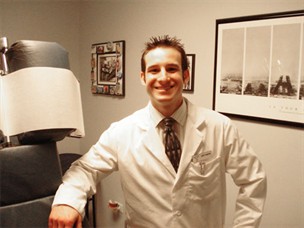Dr. Brett Martin currently teaches several biochemistry courses at National University’s Florida campus, and is an NUHS alumnus with degrees in both chiropractic medicine and acupuncture. He also has a passion for biochemistry research, and has published several papers on nutritional biochemistry.
His most recent paper, published in The Original Internist, September 2012, was co-authored with
Dr. Daniel Richardson, assistant dean of the College of Allied Health Sciences at NUHS, and titled:“Effects of Statin Drugs on Atherosclerosis and Cardiovascular Disease due to Reductase Inhibition and Nutrient Depletions.”
“In this sort of research, we’re not saying that statin medications are bad,” says Dr. Martin. “What we’re saying is medications can have different side effects and the side effects are most likely caused by a depletion of nutrients.”
“For example, in this paper we found that with statin use, CoQ10, vitamin E and beta carotene are depleted. This particular nutritional depletion profile can reduce the strength of heart contractions, while simultaneously increasing heart rate and blood pressure,” explains Dr. Martin. “Since statins are prescribed for high cholesterol, any side effects that affect heart rate and blood pressure are important to consider. If we can counter the side effects with nutritional supplements, we can reduce risk factors associated with that medication.”
This paper follows Dr. Martin’s two previous papers, also related to nutritional biochemistry: one on nutritional depletions induced by oral contraceptive use, and a second on EDTA chelation therapy and its effect on cardio-vascular disease. Dr. Martin plans more research and is currently working on a case study involving hypertension with Dr. Frank Yurasek, assistant dean for acupuncture and oriental medicine at NUHS.
Dr. Martin says he became interested in nutritional biochemistry in order to be able to educate patients on the side effects of medications. “Instead of just telling patients to ‘take these vitamins with this medication,’ we as chiropractic physicians have to be able to explain what’s going on.”
Improving patient care is ultimately why Dr. Martin is eager to share what he knows with National University’s DC students in courses such as nutritional biochemistry, human biochemistry, botanical medicine and clinical biochemistry. “I love teaching at National University’s DC program in Florida,” he says. “The campus is beautiful, and the class sizes are small so I really get to know my students well. Plus, the atmosphere for research at the university is great.”




0 Comments